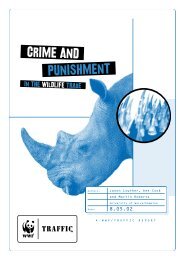COLOMBIA'S LIVING LANDSCAPE - WWF UK
COLOMBIA'S LIVING LANDSCAPE - WWF UK
COLOMBIA'S LIVING LANDSCAPE - WWF UK
You also want an ePaper? Increase the reach of your titles
YUMPU automatically turns print PDFs into web optimized ePapers that Google loves.
GUARDIANS<br />
APPEAL<br />
<strong>UK</strong><br />
2011<br />
© getty<br />
© nils auKan / <strong>WWF</strong>-Canon<br />
Colombia's oceans and coastlines are<br />
visited by hundreds of migratory species,<br />
such as the humpback whale, critically<br />
endangered marine turtles, and the largest<br />
number of North American migratory<br />
birds on the continent.<br />
Panama<br />
CARIBBEAN SEA<br />
COLOMBIA<br />
Conservation<br />
Climate Change<br />
Sustainability<br />
COLOMBIA’S <strong>LIVING</strong> <strong>LANDSCAPE</strong><br />
Colombia. A land of striking contrasts – and<br />
outstanding natural beauty. The meeting point of<br />
Central and South America, with the magnificent<br />
Andes mountain ranges running right though it, this<br />
remarkable country is literally teeming with life.<br />
Despite taking up less than 1% of the world's land<br />
area, Colombia is home to an incredible 10% of<br />
known global plant and animal species, making it<br />
one of the most biologically diverse places on Earth.<br />
© hannah Williams / <strong>WWF</strong>-uK<br />
© Diego m. garCes / <strong>WWF</strong>-Canon<br />
Diego Amorocho works with fishing<br />
communities along the Pacific coast.<br />
You'll find his story overleaf.<br />
Malaga Bay is an important breeding<br />
ground for humpback whales and marine<br />
turtles. Read more overleaf.<br />
Turtle nesting<br />
beaches<br />
PACIFIC OCEAN<br />
Malaga Bay<br />
Humpback whale<br />
breeding grounds<br />
CHOCO-DARIEN ECOREGION<br />
SPECTACLED BEAR RANGE<br />
San Francisco<br />
Pasto<br />
Lake Mocoa AMAZON<br />
La Cocha PIEDMONT<br />
ECUADOR<br />
Bogotá<br />
AMAZON<br />
BIOME<br />
VENEZUELA<br />
The Northern Andes is one of the most<br />
densely populated mountain ranges in the<br />
world, providing critical water supplies for<br />
the majority of Colombia’s population.<br />
The headwaters of the most important<br />
river systems in northern South America,<br />
including the Amazon and the Orinoco,<br />
are found here.<br />
© Pablo Corral / <strong>WWF</strong>-Canon<br />
A WILDLIFE HAVEN<br />
Colombia's diverse forests support<br />
countless species, including the<br />
spectacled bear, spider monkeys, jaguars<br />
and harpy eagles. And this incredible<br />
country has coasts on both the Pacific<br />
Ocean and Caribbean Sea. Every year<br />
humpback whales return here to breed,<br />
and five of the seven species of marine<br />
turtles nest on its beaches.<br />
Nowhere else on Earth are there so<br />
many amphibian species. And Colombia<br />
also has the third highest number of<br />
reptiles, the largest variety of butterflies<br />
and the second highest number of<br />
freshwater fish species – 3,200<br />
compared to the <strong>UK</strong>'s 50.<br />
© staFFan WiDstranD / <strong>WWF</strong><br />
© Kevin sChaFer / <strong>WWF</strong>-Canon<br />
SPECTACLED BEAR<br />
South America's only bear species<br />
is mainly found in the isolated<br />
cloud forests and mountaintop<br />
moorlands of the Andes. Its habitat<br />
is becoming increasingly patchy<br />
and fragmented due to land<br />
clearance for infrastructure,<br />
crop growing and cattle grazing.<br />
Farmer conservationist and<br />
long-time community leader,<br />
Conchita Matabanchoy lives in<br />
the forest next to Lake La Cocha.<br />
Turn over to read her story.<br />
© mary lou higgins / <strong>WWF</strong>-Colombia<br />
PERU<br />
BRAZIL<br />
© lars K. (image is taKen From <strong>WWF</strong>’s amazon alive! rePort. visit<br />
<strong>WWF</strong>.org.uK/amazonalive)<br />
AN AVIAN KALEIDOSCOPE<br />
The proposed Pasto-Mocoa road will provide a new, safer route between the two towns<br />
1/ 3<br />
A THIRD OF <strong>COLOMBIA'S</strong> PLANT SPECIES<br />
AND 12% OF ITS LAND MAMMALS DON’T<br />
EXIST ANYWHERE ELSE IN THE WORLD<br />
Over 1,800 bird species are found here – more than in any other country in the world.<br />
Fascinating feathered inhabitants include the spectacular scarlet macaw, the colourful<br />
toucan and a wide variety of hummingbirds.<br />
© Diego m. garCes / <strong>WWF</strong>-Canon<br />
Pasto<br />
EXISTING ROADS<br />
NEW ROAD<br />
San Francisco<br />
Mocoa<br />
© emilio Constantino / <strong>WWF</strong>-Colombia<br />
Lake La Cocha
© Diego m. garCes / <strong>WWF</strong>-Canon<br />
DECADES OF SUCCESS<br />
Thanks to the Guardians' support we have a long and successful<br />
track record in Colombia. Here are just a few examples.<br />
PROTECTING MALAGA BAY<br />
MAKING NATURAL PARTNERSHIPS<br />
We’re helping local farmers in Pasto protect the forest and get<br />
more from their land.<br />
Conchita Matabanchoy has lived in Pasto,<br />
south-west Colombia, all of her life.<br />
Although poor, she was so convinced of<br />
the need to safeguard the natural<br />
environment that she designated her own<br />
land as a nature reserve. And she's spent<br />
her life helping other local people live<br />
sustainably and protect the forest.<br />
When Conchita was a child, timber and<br />
charcoal production were the main<br />
sources of income for small-scale local<br />
farmers, and the whole family were<br />
involved in the process.<br />
"Children didn't have time to be children,"<br />
recalls Conchita. "They worked with their<br />
families when they turned four, and<br />
women's roles in the household were<br />
not recognised."<br />
© Diego m. garCes / <strong>WWF</strong>-Canon<br />
SUPPORTING SEAS OF CHANGE<br />
We’re protecting marine turtles while improving<br />
the lives of coastal communities.<br />
A remarkable man, Dr. Diego Amorocho,<br />
has dedicated thirty years of his life to<br />
researching and protecting marine turtles.<br />
He founded and now heads the Research<br />
Centre for Environmental Management<br />
and Development (CIMAD). This <strong>WWF</strong>supported<br />
organisation promotes<br />
community-based conservation across<br />
Colombia's Pacific coast.<br />
A difficult dilemma<br />
Five out of the seven marine turtle species<br />
visit Colombia's waters, including critically<br />
endangered hawksbill and leatherback<br />
turtles. But marine turtles are often<br />
innocent victims of unsustainable fishing<br />
practices. Thousands every year are snared<br />
on long-line fishing hooks, or caught in<br />
trawl nets, and drown. Turtles and their<br />
eggs are also poached for food and money.<br />
In past decades these threats have caused<br />
a dramatic decline in turtle numbers.<br />
Expanding coastal development is only<br />
adding to the pressure, as it disturbs turtle<br />
nesting sites.<br />
An inspired solution<br />
100%<br />
RECYCLED<br />
Many people living along Colombia's<br />
Pacific coast rely on fishing for their<br />
livelihoods. CIMAD's work links the<br />
turtle's protection with the wellbeing of<br />
coastal communities. Local fishermen are<br />
shown turtle-friendly fishing methods,<br />
such as circle hooks, that reduce the risk<br />
of turtles being accidentally caught.<br />
They're also taught turtle first-aid,<br />
enabling them to treat and release<br />
caught turtles.<br />
• GUARDIANS APPEAL 2011 • COLOMBIA<br />
© lilian Flórez / FunDaCión yubarta<br />
This beautiful bay lies in the central part of Colombia’s Pacific<br />
coast. It’s globally recognised as one of the most important<br />
breeding and nursing sites for humpback whales. Every year,<br />
between 500 and 700 visit to mate and rear their young.<br />
Disruption and destruction<br />
Five years ago, plans were being made to<br />
build an industrial port in Malaga Bay,<br />
which would have been catastrophic for<br />
wildlife. Thanks to the Guardians’<br />
generosity, what was almost a disaster is<br />
now a real success story.<br />
A major achievement<br />
The Guardians' donations helped fund our<br />
crucial campaign to lobby the Colombian<br />
government and raise public awareness of<br />
the consequences of a new port. And after<br />
intense debate, the government finally<br />
declared Malaga Bay a protected area in<br />
2010. We were fully involved in all stages<br />
of the technical design of plans for the<br />
new Malaga Bay Uraba National Park,<br />
which now protects over 47,000 hectares<br />
of ocean and coastline, an area twice the<br />
size of London.<br />
The government's decision opens up a<br />
new page for the future of the Malaga Bay<br />
region and the whole country. It’s been a<br />
long and arduous struggle, but the end<br />
result is worth it. And with your support<br />
we can achieve even more.<br />
148<br />
MALAGA BAY IS<br />
HOME TO 148<br />
SPECIES OF<br />
SALTWATER AND<br />
FRESHWATER FISH<br />
It's critical that we continue to<br />
strengthen the management of<br />
existing protected areas. These<br />
include mangroves in the southern<br />
Pacific coast area; and Gorgona and<br />
Sanquianga National Parks – vital<br />
habitats for sea birds, marine<br />
mammals, fish and marine turtles.<br />
We're also working to make sure<br />
that by 2013 two new coastal sites<br />
become integrated into Colombia's<br />
protected area network. One of<br />
these, Acandí, is an important<br />
nesting site for critically endangered<br />
leatherback and hawksbill turtles.<br />
500-700<br />
BETWEEN 500 AND 700 HUMPBACK<br />
WHALES A YEAR VISIT MALAGA<br />
BAY TO BREED, GIVE BIRTH AND<br />
NURSE THEIR YOUNG<br />
Life was tough, and the relentless<br />
deforestation took its toll on the<br />
beautiful natural environment.<br />
A woman of vision<br />
Believing she could change things, Conchita organised her<br />
neighbours into a local community group that revived a<br />
traditional practice of co-operative working, known as the 'minga’.<br />
Conchita's minga set up a loan scheme for small-scale<br />
agricultural projects such as raspberry plantations. It meant that<br />
families could support themselves without destroying trees to<br />
make charcoal. The forests began to regenerate and many<br />
species that had previously disappeared returned to the area.<br />
Private nature reserves<br />
The projects were so successful that local<br />
communities began turning their<br />
properties into private conservation areas<br />
and created a network of private nature<br />
reserves. And Conchita became a founding<br />
member of the Association for Small<br />
Farmer Development (ADC), which is<br />
supported by <strong>WWF</strong>.<br />
Working together, we now help over 3,000<br />
people from 550 rural families manage<br />
their lands sustainably using traditional<br />
knowledge and practices. We’ve also<br />
overcome threats, like a large-scale dam<br />
development planned for Lake La Cocha.<br />
If this had gone ahead it would have<br />
destroyed some of the most unique<br />
mountain grasslands in the world, and<br />
with it countless critical wildlife habitats.<br />
3,000<br />
WE NOW HELP OVER<br />
3,000 PEOPLE FROM<br />
550 RURAL FAMILIES<br />
MANAGE THEIR<br />
LANDS SUSTAINABLY<br />
Working with the ADC and other<br />
conservation partners, we managed to get<br />
the area around the lake designated as a<br />
wetland of international importance, and<br />
plans for the dam were cancelled.<br />
The ADC’s hard work, perseverance<br />
and dedication has been recognised<br />
internationally with the winning of<br />
several prestigious environmental<br />
awards. Your donation will help us<br />
to carry on working in partnership<br />
with them and our other<br />
conservation partners. We can<br />
also go on supporting local<br />
communities, and help create<br />
more private nature reserves.<br />
© eDWarD ParKer / <strong>WWF</strong>-Canon<br />
Turtles needing specialist care are taken to<br />
CIMAD’s Sea Turtle Rehabilitation Centre,<br />
which also offers community education,<br />
from basic literacy to mentoring the next<br />
generation of conservation scientists.<br />
When they are released from the centre<br />
the turtles are fitted with a satellite tag and<br />
monitored, allowing local schoolchildren<br />
to follow their migration online.<br />
Generating new local businesses is also<br />
important. In an initiative led by wives of<br />
local fishermen, plastic litter cleared from<br />
beaches is being turned into hand-woven<br />
bags and hats, preserving turtle nesting<br />
sites and boosting incomes.<br />
Diego is now working towards the<br />
implementation of a Pacific regional<br />
action plan to secure a long-term<br />
future for turtles. In 2010 he won<br />
the prestigious Whitley Award, a top<br />
nature conservation prize awarded<br />
to individuals leading sustained,<br />
effective efforts to conserve the<br />
natural environment.<br />
Your support today means we can<br />
go on giving technical, logistical and<br />
financial assistance to Diego and<br />
CIMAD's projects now and in the<br />
future. It also means we can increase<br />
our work with commercial fisheries<br />
to promote sustainable fishing<br />
practices, like circular hooks.<br />
Why we are here<br />
To stop the degradation of the planet’s natural environment and<br />
to build a future in which humans live in harmony with nature.<br />
wwf.org.uk<br />
<strong>WWF</strong>-uK, registered charity number 1081247 and registered in scotland number sC039593. a company<br />
limited by guarantee number 4016725 © 1986 panda symbol and ® “<strong>WWF</strong>” registered trademark of<br />
<strong>WWF</strong>-World Wide Fund For nature (formerly World Wildlife Fund), <strong>WWF</strong>-uK, Panda house, Weyside Park,<br />
godalming, surrey gu7 1Xr, t: +44 (0)1483 426333, e: supportercare@wwf.org.uk, wwf.org.uk<br />
5<br />
FIVE OUT OF SEVEN<br />
MARINE TURTLE SPECIES VISIT<br />
<strong>COLOMBIA'S</strong> WATERS, INCLUDING<br />
ENDANGERED HAWKSBILL AND<br />
LEATHERBACK TURTLES<br />
© jürgen FreunD / <strong>WWF</strong>-Canon © jürgen FreunD / <strong>WWF</strong>-Canon<br />
<strong>WWF</strong>.ORG.<strong>UK</strong>/GUARDIANS


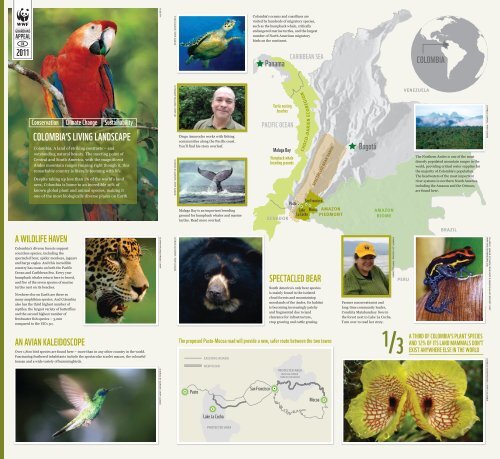
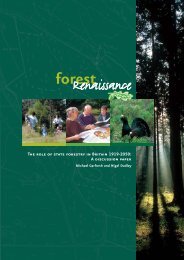
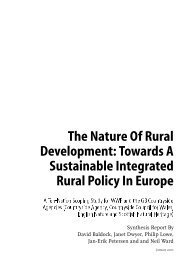
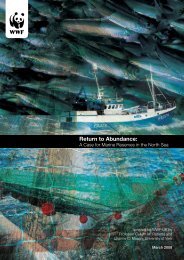
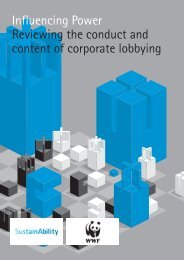
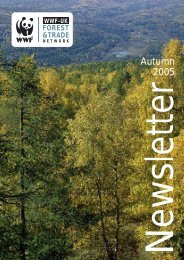
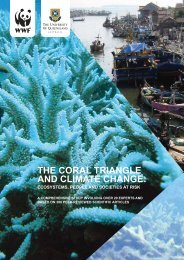
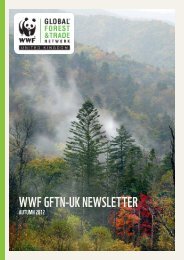
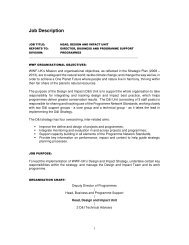
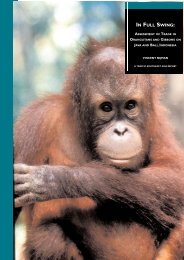
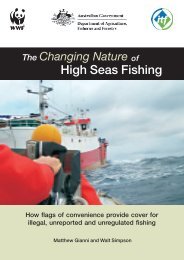
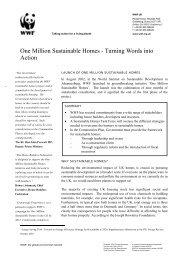
![[PDF] Causes for concern: chemicals and wildlife - WWF UK](https://img.yumpu.com/31929970/1/184x260/pdf-causes-for-concern-chemicals-and-wildlife-wwf-uk.jpg?quality=85)
